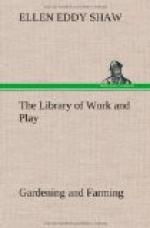“Each girl and boy gardener should try to make her or his garden into a place attractive to birds and toads. A good birdhouse, grain sprinkled about in early spring, a water-place, are invitations for birds to stay a while in your garden. If you wish toads, fix things up for them too. During a hot summer day a toad likes to rest in the shade. By night he is ready to go forth to eat but not to kill, since toads prefer live food. How can one “fix up” for toads? Well, one thing to do is to prepare a retreat, quiet, dark and damp. A few stones of some size underneath the shade of a shrub with perhaps a carpeting of damp leaves, would appear very fine to a toad.
“Suppose a certain crop in your garden has had an insect pest. Do not plant this same crop next year, for it would doubtless have the same pest. Don’t let the soil get full of insect troubles; therefore, keep the soil open and aired and study it well.
“There are two general classes of insects known by the way they do their work. One kind gnaws at the plant really taking pieces of it into its system. This kind of insect has a mouth fitted to do this work. Grasshoppers and caterpillars are of this sort. The other kind sucks the juices from a plant. This, in some ways, is the worst sort. Plant lice belong here, as do mosquitoes, which prey on us. All the scale insects fasten themselves on plants, and suck out the life of the plants.
“Now can we fight these chaps? The gnawing fellows may be caught with poison sprayed upon plants, which they take into their bodies with the plant. The Bordeaux mixture which Peter used is a poison sprayed upon plants for this purpose. So, too, is Paris green.
“In the other case the only thing is to attack the insect direct. So certain insecticides, as they are called, are sprayed on the plant to fall upon the insect. They do a deadly work of attacking, in one way or another, the body of the insect. The kerosene emulsion made by the girls for their infested house plants worked this same way. Tobacco water and tobacco dust sprinkled on act in similar manner.
“Lime, soot, and sand are other means of blocking and choking off insects.
“Sometimes we are much troubled with underground insects at work. You have seen a garden covered with ant hills. Here is a remedy, but one of which you must be careful.
“Carbon bisulphid comes in little tin cans. It is a liquid of a vile smell, something like onions and rotten eggs mixed. The girls’ noses are going up sky-high now. But it does the work of ant killing. You must be careful in handling this. It has a horrid explosive habit. Pour about a teaspoonful down an ant hole. Do not use a good silver spoon from the dining room. Get an old spoon, or buy a tin one. For you will never use it again except it be for carbon-bisulphid work. After this liquid has been poured down the hole, place a bit of a chip over it, for there may be a slight volcanic action underground. It is well to do this on a damp, cloudy day when all the ants are at home.




